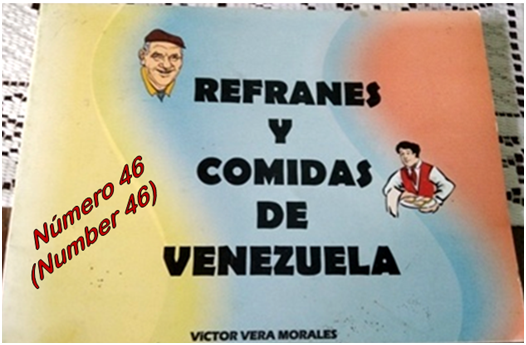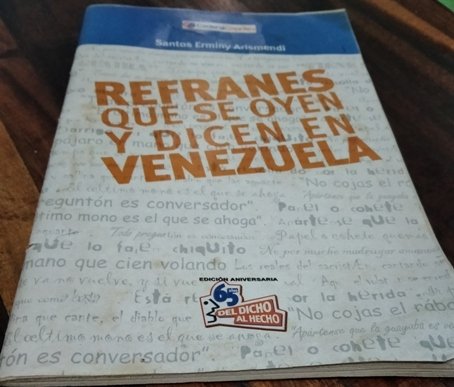[ESP/ENGL] Cinco sabios refranes venezolanos (Número 46) // Five wise Venezuelan sayings (Number 46)


Un entrépito es una persona a quien le encanta interferir en la vida de los demás, sin que le hayan dado ese derecho, es decir, lo hace por motus propio. Entonces, cuando se usa este refrán, lo que se intenta es aconsejar el ser prudente y no interferir en asuntos ajenos, pues se pueden conseguir un mal resultado, incluso la muerte.
Esto quiere decir que quien tiene faltas similares a las que quiere criticar, mejor se calla y no dice nada, porque aquello que está criticando lo padece también. Es similar al refrán que dice: “El que tiene tejas de vidrio, no le tire piedras al vecino,” así que mejor ser prudente y no estar criticando a otros.
Creo que éste no es un dicho solo venezolano, si no de carácter más universal y lo oigo y utilizo en varias oportunidades; especialmente cuando se presentan casos en que una persona que no tiene absolutamente ninguna vinculación con un asunto específico, se pone de parte un bando o de otro; es decir, toma partida en una pelea sin ser parte de ella, sin tener una visión concreta y real de la situación, sino que se encuentra sesgada su opinión, bien sea por un chisme, calumnia o información distorsionada. Por tal razón, antes de involucrarte en una pugna que realmente no te afecta directamente ni en la cual estás involucrado, piensa con detenimiento si no estarás peleando peleas ajenas. Hacerlo realmente no vale el riego, ni el esfuerzo, ni el tiempo, ni la energía invertidos.
Del anterior refrán, salto a este, pues ambos se complementan, y es preciso indicar que también lo utilizo con frecuencia. Ser tonto útil es similar a “ser escalera de otro”, o sea, servir a los intereses de alguien más, ser utilizado para el beneficio de un tercero sin que sepas o te des cuenta de lo que estás haciendo; de allí que señale la complementariedad existente entre ambos refranes.
Una totuma es un recipiente, hecho de una calabaza hueca partida a la mitad, a modo de cuenco. Así que cuando se emplea este refrán se quiere decir que no vale la pena el esfuerzo para la ganancia que se obtendrá, o que una situación o persona, es algo insignificante para otra. Es como el dicho aquel: “Es mucho camisón para Petra”.



A nosy (entrépito) is a person who loves to interfere in the lives of others, without being given that right, that is, he does it on his own initiative. So, when this saying is used, what is intended is to advise being prudent and not interfering in other people's affairs, as a bad result can be achieved, even death.
This means that whoever has faults similar to those he wants to criticize, better shut up and say nothing, because what he is criticizing suffers from it too. It's similar to the saying: “He who has glass roof tiles, don't throw stones at his neighbor,” so it's best to be prudent and not criticize others.
I believe that this is not just a Venezuelan saying, but a more universal one, I have heard it and have used it on several occasions; especially when there are cases in which a person who has absolutely no connection with a specific issue takes one side or the other; that is, they take part in a fight without being part of it, without having a concrete and real vision of the situation, but their opinion is biased, either by gossip, slander or distorted information. For this reason, before getting involved in a fight that does not really affect you directly or in which you dont are involved, think carefully if you will not be fighting other people's fights. Doing it really isn't worth the risk, the effort, the time, or the energy invested.
From the previous saying, I jump to this one, since both complement each other, and it is necessary to indicate that I also use it frequently. Being a useful fool is similar to “being someone else's ladder”, that is, serving the interests of someone else, being used for the benefit of a third party without you knowing or realizing what you are doing; hence it points out the complementarity between both proverbs.
A totuma is a container, made of a hollow gourd cut in half, like a bowl. So when this saying is used, it means that it is not worth the effort for the gain that will be obtained, or indicates that a situation or person is something insignificant for another. It's like the old saying: “It's a lot of nightgown for Petra”.
.png)
Dear readers, below I place the links of the first 45 posts, in case you want to read them:
Víctor Vera Morales. (Agosto 2004). Refranes y Comidas de Venezuela. Editado por el Instituto Municipal de Publicaciones de la Alcaldía de Caracas.
Santos Erminy Arismendi. (2006). Refranes que se oyen y dicen en Venezuela. Cadena Capriles, Caracas. Venezuela.
- Fotos de mi autoría, tomada con un teléfono REDMI 8A, intervenida con WordArt / Photos of my authorship, taken with a REDMI 8A telephone, intervened with WordArt.
- Los diseños incluidos en esta publicación, han sido elaborados por mi persona con la aplicación CANVA / The designs included in this publication has been made by me with the CANVA application.
In the event that it is required to use the content or images of this post and my other publications, I would be grateful if my authorship (Fabiola Martínez) was made and the corresponding link was cited. Thank you.

 Delegations welcome!
Delegations welcome!

Your content has been voted as a part of Encouragement program. Keep up the good work!
Use Ecency daily to boost your growth on platform!
Support Ecency
Vote for new Proposal
Delegate HP and earn more
Thanks a lot for your support!
Me encantó tu post amiga @sirenahippie, al leer recordé mucho a mi amada madre, ella los utilizaba mucho, pero la verdad el primero e el último no los había escuchado, de verdad que eso de los refranes es súper interesante. Gracias por compartir. Saludos❤️😜
Hola @letrasyaventuras muchas gracias por tu visita y hermoso comentario en mi blog, es un gusto verte por aquí. Que bueno que este post sirvió para que tuvieses hermosos recuerdos.
Los refranes son muyyy amplios y diversos, algunos son tan localistas que difícilmente se pueden oír fuera de una zona geográfica; por eso considero importante darles a conocer.
Un gran saludo para tí también.